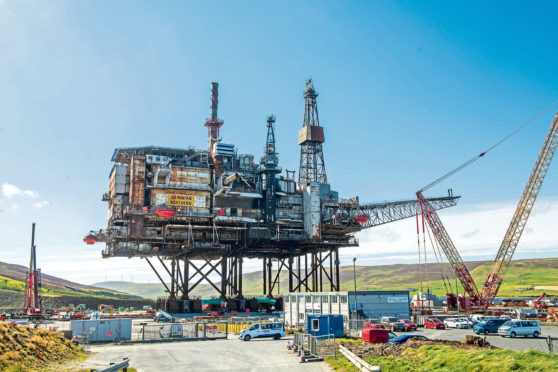The cancellation of all cruise liner visits because of the Covid-19 crisis has contributed to a 77% slump in passenger traffic at Shetland’s main port this year, according to new figures.
Yesterday the chief executive of Lerwick Port Authority (LPA), Calum Grains, described the impact on its operations of the pandemic and low oil prices as “dire”.
LPA’s latest statistics showed the number of vessel arrivals at the port between January and September was down 16% in comparison with the same period in 2019, at a total of 3,315.
There was a 49% reduction in oil-related calls year-on-year and the overall tonnage of shipping dropped 40% over the period to 6,115,404 gross tonnes.
At 559,224 tonnes, cargo movements at Lerwick were down 18% on the previous year, including a 28% fall in freight for the oil and gas industry.
The year-to-date total for the number of passengers using the port came in at 44,958. The number of people using Aberdeen-Kirkwall ferries in the first nine months of this year was 64% lower than in 2019 at 43,459.
Mr Grains said: “We are seeing the dire effects of the pandemic across harbour operations and the Shetland economy, and continue to do everything possible to operate safely, while making the most of business opportunities.
“The latest statistics for the third quarter show reduced traffic continuing from the first half of the year, caused by the virus and the downturn in oil prices which gives the offshore industry its own challenges.”
The number of fishing boats arriving at Lerwick between January and September was up 7%.
There were 153,385 boxes of white-fish landed during the nine months, which was 15% fewer than last year.
LPA added that in the pelagic sector a successful herring fishery had now been completed, with the mackerel season now under way.
Mr Grains said, despite the poor figures, there had been positive developments at the port this year.
“The latest quarter has seen a number of positives, among them the opening of the new state-of-art white-fish market and volumes of fish landed beginning to recover from earlier in the year,” he said.
He added: “The arrival of the Ninian Northern topside – the port’s biggest decommissioning project yet – meant the inauguration of another heavy-duty decommissioning pad and we are involved in active inquiries for future projects.
“The first phase of support for an offshore mooring system has been completed, with a second phase due in 2021.
“Oil-related facilities and experience mean Lerwick is well-placed to service renewable energy offshore and onshore.
“There are strong cruise bookings for 2021, although changes are anticipated as the industry works through the lengthy process for gradually restarting.”
More than 100 cruise liners were expected to visit Lerwick over the summer and autumn months of this year, carrying in excess of 90,000 passengers to the islands and setting new records for the sector there.
Last year the port was ranked among the top five UK and western Europe cruise ship destinations.
A visitor survey carried out in 2019 identified a visitor spend of almost £36 million during the year.
